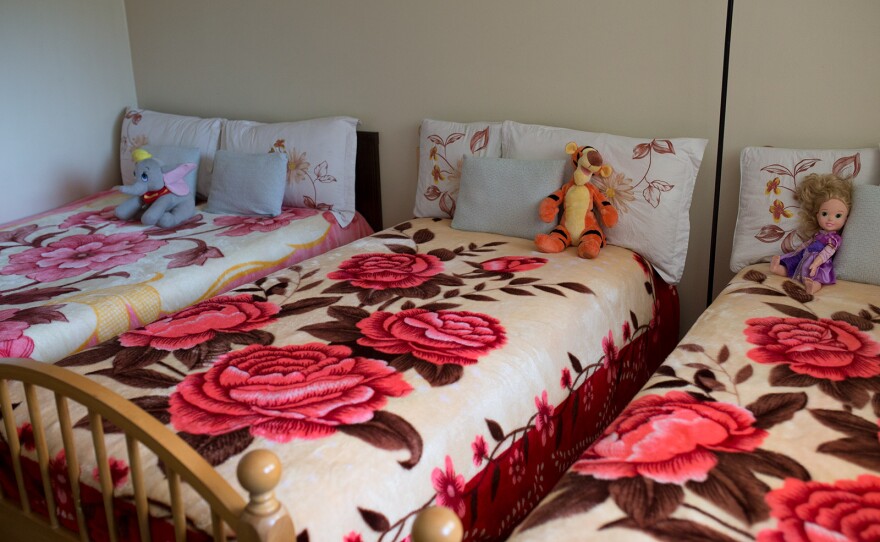Nearly 2 years old and barefoot, Jana Zain Alabedeen wobbles around the front lawn of her family's new home in El Cajon. The toddler plays with a tub of blocks in the corner, moves on to a worn baseball on the ground, then finally settles on rolling a basketball about the fenced-in yard. Her father, Samir Zain Alabedeen, encourages her in Arabic as she unsteadily kicks it across the grass.
The Alabedeens, a refugee family of eight from Syria, recently moved into the three-bedroom house after they were asked to vacate their less-expensive, two-bedroom apartment because too many people lived there. Alabedeen said the larger space is a welcome change.
"We are comfortable with the house, and the kids have taken comfort," the father said through a translator during an interview in December. "It’s true that it is expensive, but we are comfortable."
The Alabedeens were one of at least seven families that KPBS found had been placed under false leases by the International Rescue Committee in San Diego. Large families were living in small but affordable apartments in violation of occupancy limits. Employees at the local office of the resettlement agency, a nonprofit funded in part through donations and taxpayer dollars, encouraged families to sign rental documents that omitted names to conceal the true size of families.
When some of the landlords found out, families faced notices to vacate.
Since the KPBS investigation was published in July, the local IRC said it has counseled its staff on lease practices and offered help to the affected families.
Not all refugees have been as fortunate as the Alabedeens.
IRC San Diego Acting Director Mireille Cronin Mather told KPBS in November that the agency conducted an internal report and found 24 families affected by the improper housing placement practice, which she referred to as “isolated incidences.” She said the IRC placed 2,200 refugees over the “last couple of years.”
Cronin Mather said the agency has since retrained its staff, and no longer accepts refugee families that are larger than six people unless they already have familial ties to San Diego. The region’s high rental prices and low vacancy rates can make it difficult for resettlement staff to find adequate, affordable apartments.
The former executive director has also stepped down, Cronin Mather said.
"Immediately after the investigation confirmed that there were some of these practices, and we identified these families, we reached out to each of these families to do a home visit with them, to explain the situation and their options and what support they may want from us that we could provide," she said.
Alabedeen said the IRC contacted him after KPBS's initial stories last summer and offered to help him find a place he could afford. He said the agency's staff made calls on his behalf about apartments he found, but ultimately, community members helped him move to his larger home.
The situation has been different for Mohamad Abdullah, a refugee from Syria. As of December, his family of eight was still living in the two-bedroom apartment where the IRC placed them in 2016. Abdullah said he is worried he could be asked to leave the apartment any day. He said he’d like to relocate, but he’s having trouble qualifying for a larger home with his low income.
“We don’t have a sponsor to get the house. Secondly, they want the credit to be above three thousand and I’ve only been working — it’s been a week since I started a new job,” Abdullah said in Arabic through a translator.

He said he was contacted by the IRC after he spoke to KPBS. An employee asked if he wanted help finding a new place. He said he told her he was open to it, but that he didn’t have faith in the agency.
“She asked me, ‘If we found you a bigger house, would you be willing?’ I told her, ‘I would be willing, yes, but I don’t have any trust,” he told KPBS in early December.
Abdullah said since then, he hasn't heard from the IRC about housing but has spoken with staff about employment opportunities.
An IRC spokesman said Abdullah’s account isn’t consistent with its records, but did not provide details.
Of the five other families initially interviewed by KPBS:
–Two now live in adequately sized homes. One family received help from community members to find a larger apartment and another family’s situation rectified itself when an older child moved out.
–A third family said it moved to Michigan because it was more affordable.
–Two other families are, as of December, still living in El Cajon apartments that are too small for the number of people living in them. One had been asked to leave by the landlord, but after KPBS contacted the company that recently purchased the complex, the vice president said the family wouldn’t be forced to move until it found a larger home.
In an emailed statement, an IRC spokesman reiterated that it reached out to affected families and offered assistance with new housing, but some chose to remain in their current homes.






